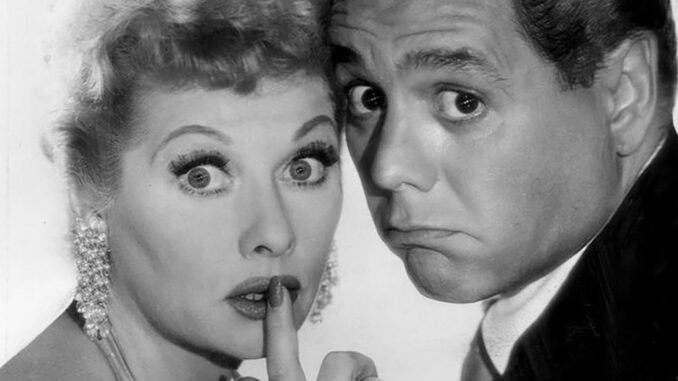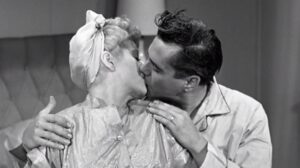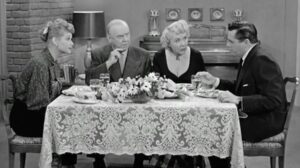
Introduction: The Unforgettable Legacy of ‘I Love Lucy’
Think about the shows you binge-watch today. Would they exist without I Love Lucy? Probably not. This iconic sitcom didn’t just entertain—it reshaped television forever. From groundbreaking production techniques to redefining comedic timing, I Love Lucy set the gold standard. But what exactly made this show such a game-changer?
Let’s dive into how I Love Lucy transformed the television landscape and why its influence still echoes today.
The Birth of the Multi-Camera Sitcom
Why Filming in Front of a Live Audience Changed Everything
Before I Love Lucy, sitcoms were often filmed like stage plays or on single cameras with canned laughter added later. Desi Arnaz and Lucille Ball flipped the script by filming in front of a live audience using multiple cameras. This allowed for authentic audience reactions, making the comedic timing sharper and more engaging. Ever notice how laughter feels more contagious in a packed room? That’s the magic they captured.

The Rise of Syndication: Lucy’s Gift That Keeps Giving
Why I Love Lucy Was One of the First Shows to Go Syndicated
I Love Lucy didn’t just dominate its prime-time slot—it kept going long after. Desi Arnaz understood the value of reruns, so they filmed the show on high-quality 35mm film. This decision paved the way for syndication, meaning the show could be enjoyed by future generations. Today’s endless reruns of your favorite series? You can thank I Love Lucy for that.
Breaking Barriers: A Latina and an Interracial Couple on TV
Lucille Ball and Desi Arnaz: A Love Story That Defied Hollywood Norms
In the conservative 1950s, showcasing an interracial couple on TV was unheard of. Yet, I Love Lucy boldly put Desi Arnaz, a Cuban immigrant, in a leading role alongside Lucille Ball. This wasn’t just a statement—it was a revolutionary move that reflected the couple’s real-life relationship.
Pregnancy on Prime-Time: A Bold Move for Its Time
Why Lucy’s Pregnancy Was a Groundbreaking TV Moment
When Lucille Ball became pregnant, rather than hide it, the writers worked it into the show. For the first time, viewers saw a pregnant woman on TV. This was a significant step forward in normalizing pregnancy in media, even though they had to carefully navigate 1950s censorship rules. “Pregnant” wasn’t even a word they could say on air!
Inventing the Clip Show: The First Flashback Episode
How ‘I Love Lucy’ Pioneered the Flashback Formula
Ever watched a “best moments” episode? I Love Lucy did it first. When production schedules got tight, they cleverly pieced together clips from previous episodes to create a seamless flashback storyline. This move not only saved time but also gave fans a nostalgic trip down memory lane.
Financial Independence: The Lucille Ball & Desi Arnaz Empire
How Desilu Productions Changed Television Production Forever
Did you know that Lucille Ball and Desi Arnaz owned their show? Through Desilu Productions, they retained creative control and reaped the financial rewards. Their success laid the groundwork for actors and creators to gain more power over their work, influencing how Hollywood operates today.
The First Female TV Executive: Lucille Ball’s Historic Achievement
Lucille Ball didn’t just act—she was a powerhouse behind the scenes. After her divorce from Arnaz, she bought out his share of Desilu Productions, becoming the first woman to run a major television studio. Under her leadership, Desilu produced classics like Star Trek and Mission: Impossible.

The Genius of Desi Arnaz: The Forgotten Innovator
While Lucille Ball often gets the spotlight, Desi Arnaz was the visionary behind the show’s technical innovations. His insistence on multi-camera setups, live audiences, and reruns changed how TV was made and consumed. He was more than Ricky Ricardo; he was a trailblazer who forever altered the industry.
How I Love Lucy Perfected Physical Comedy
The Iconic Chocolate Factory Scene: A Masterclass in Comedy
Who can forget Lucy and Ethel’s misadventure at the chocolate factory? This episode exemplifies the show’s genius for physical comedy. Lucille Ball’s impeccable timing, paired with Vivian Vance’s chemistry, created scenes that are still meme-worthy today.
Why I Love Lucy Remains a Cultural Touchstone
Its Influence on Modern Sitcoms
From Friends to The Office, the DNA of I Love Lucy runs through countless modern sitcoms. Its emphasis on character-driven humor, real-time reactions, and relatable storylines set a template that shows still follow today.
Lessons in Friendship: Lucy and Ethel’s Unbreakable Bond
At its heart, I Love Lucy was about relationships—especially the friendship between Lucy and Ethel. Their antics, misunderstandings, and loyalty showcased a timeless depiction of female friendship that still resonates.
Why We’re Still Laughing 70 Years Later
The Timelessness of Lucy’s Humor
Good comedy ages well, and I Love Lucy proves it. Despite being set in the 1950s, the humor remains fresh because it taps into universal themes like love, ambition, and the occasional chaos of daily life.
The Show’s Impact on Pop Culture
From Halloween Costumes to Viral Memes
Even decades later, I Love Lucy is a pop culture staple. From Lucy’s signature polka-dot dress to gifs flooding social media, the show continues to capture new audiences.
Conclusion: Why We Should Never Forget I Love Lucy
I Love Lucy wasn’t just a sitcom; it was a cultural revolution. Its groundbreaking innovations changed how TV shows were made, distributed, and even experienced. From redefining comedy to pioneering production techniques, its influence is woven into the fabric of television history. So, the next time you laugh at your favorite sitcom, remember—Lucy did it first.
FAQs
1. What made I Love Lucy so revolutionary?
The show introduced multi-camera filming, live audiences, and reruns, all of which set new industry standards.
2. Why was Lucille Ball’s pregnancy on TV significant?
It broke societal taboos by showing a pregnant woman on TV, paving the way for more realistic portrayals of family life.
3. How did I Love Lucy influence modern sitcoms?
The show’s focus on character-driven humor and innovative filming techniques laid the foundation for today’s sitcoms.
4. What role did Desi Arnaz play behind the scenes?
He was instrumental in introducing multi-camera setups and syndication, revolutionizing TV production.
5. Why is I Love Lucy still relevant today?
Its timeless humor, relatable characters, and groundbreaking innovations continue to entertain and inspire new generations.